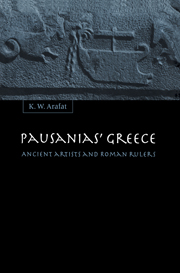Book contents
- Frontmatter
- Contents
- Map of Roman Greece
- Preface and acknowledgements
- List of abbreviations
- Chapter 1 Introduction
- Chapter 2 Pausanias on the past
- Chapter 3 Pausanias on the rulers of Roman Greece 1: introduction, Mummius and Sulla
- Chapter 4 Pausanias on the rulers of Roman Greece 2: Caesar and Augustus
- Chapter 5 Pausanias on the rulers of Roman Greece 3: Nero to Marcus Aurelius
- Chapter 6 Pausanias on Herodes Atticus and other benefactors
- Chapter 7 Conclusions
- Bibliography
- Index of Pausanias passages cited
- Index of other authors and passages cited
- General index
Preface and acknowledgements
Published online by Cambridge University Press: 22 September 2009
- Frontmatter
- Contents
- Map of Roman Greece
- Preface and acknowledgements
- List of abbreviations
- Chapter 1 Introduction
- Chapter 2 Pausanias on the past
- Chapter 3 Pausanias on the rulers of Roman Greece 1: introduction, Mummius and Sulla
- Chapter 4 Pausanias on the rulers of Roman Greece 2: Caesar and Augustus
- Chapter 5 Pausanias on the rulers of Roman Greece 3: Nero to Marcus Aurelius
- Chapter 6 Pausanias on Herodes Atticus and other benefactors
- Chapter 7 Conclusions
- Bibliography
- Index of Pausanias passages cited
- Index of other authors and passages cited
- General index
Summary
The origin of this study lies unashamedly in its author's fascination with Pausanias, who has been (to borrow a phrase used by Sir John Beazley of the Berlin Painter) ‘a friendly presence’ in the study, in the lecture room and on site for ten years.
Chapter 2 is adapted from Arafat (1992), parts of which have also been used in chapter 1 (with the kind permission of the British School at Athens). References to Pausanias are taken from the Teubner edition of M.H. Rocha-Pereira, vols. I—III (2nd edn, Leipzig 1989—90). Unless otherwise specified, translations of Pausanias are taken from Frazer vol. 1, and of other authors from the Loeb editions, in both cases with modifications. Transliterations are mainly Hellenized, but some inconsistencies result from the retention of familiar forms.
The researching of this book, as well as its writing, has been immeasurably enhanced by the companionship of Catherine Morgan who (if I may return the compliment) ‘bore the rigours of fieldwork with fortitude’. I also owe much to my parents for their unstinting support, expressed in so many forms. I have benefited greatly from the patient encouragement of Pauline Hire of Cambridge University Press, and from the comments of the anonymous referees. The help of the staff and volunteers of the Library of the Institute of Classical Studies in London has considerably facilitated my work.
- Type
- Chapter
- Information
- Pausanias' GreeceAncient Artists and Roman Rulers, pp. xiii - xivPublisher: Cambridge University PressPrint publication year: 1996

